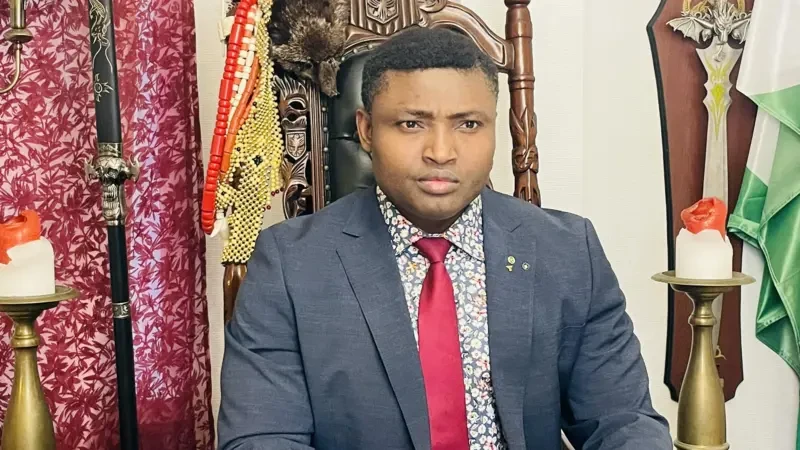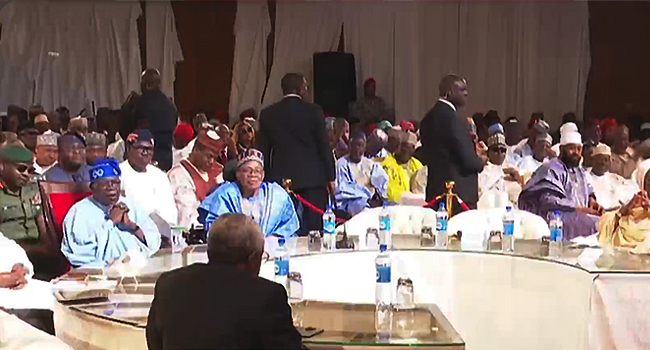News
From Detention to Legislation: How Simon Ekpa Rules Biafra from Finland

Despite being held in detention in Finland, controversial Biafran agitator Simon Ekpa has continued to exert influence over the Biafran separatist movement, introducing two new bills aimed at addressing insecurity in Nigeria’s South-East region.
The announcement, made during a virtual cabinet meeting of the self-declared United States of Biafra (USB), underscores Ekpa’s unwavering grip on the movement even from behind bars.
Ekpa’s legislative push comes in the wake of escalating violence in the region, notably the recent massacre in Nkalaha community where over 20 people were killed.
The two bills—the Rights to Bear Arms and Self-Defence Act 27/2025 and the Arms Manufacturing Bill Act 28/2025—are designed to empower Biafrans to protect themselves against what Ekpa describes as state-sponsored violence and unchecked aggression from non-state actors.
Ekpa, who has been a polarizing figure since taking up the mantle of leadership after Nnamdi Kanu’s arrest, remains a force in Biafran politics despite his legal troubles abroad.
His detention in Finland, related to alleged incitement of violence in Nigeria, has not stopped him from maintaining control over USB operations.
The introduction of these bills suggests a calculated effort to solidify his leadership and reinforce his vision for a militarized Biafra capable of self-defense.
In a statement posted on X (formerly Twitter) by Dr. Ngozi Orabueze, Deputy Prime Minister and Chief of Staff of USB, the urgency of these legislative measures was emphasized. “Self-defence is necessary to the security of liberty and a free state.
The right of the people to keep and bear arms for the purpose of defending themselves and the state shall not be infringed,” the statement read.
The second bill, which proposes the establishment of local arms manufacturing capabilities, is aimed at reducing dependency on external sources for weapons and increasing the self-reliance of the separatist state. “The United States of Biafra, as a state, is tasked with obtaining the means to locally manufacture weapons of a defensive nature to be used to defend the State and people,” Dr. Orabueze stated.
Ekpa’s legislative efforts are a direct response to recent violence in the South-East, where security forces and non-state actors have been implicated in a wave of killings. According to a report by the International Society for Civil Liberties and Rule of Law (Intersociety), 180 people were killed in the Biafra territory between December 2024 and January 2025.
Despite these alarming statistics, Nigerian security agencies have remained conspicuously silent, offering no official response to the report. This silence has fueled accusations of complicity and further alienated the South-East from the central government, adding more weight to separatist rhetoric.
Ekpa’s ability to govern and legislate from detention highlights a unique dynamic in modern separatist movements, where physical presence is no longer a prerequisite for leadership. Leveraging digital platforms and virtual meetings, Ekpa continues to rally support and steer the Biafran cause from afar.
However, his activities have drawn sharp criticism both within Nigeria and internationally.
Human rights groups have accused him of inciting violence through his broadcasts, while others argue that his legislative push could escalate tensions in the region.
There are growing calls for his repatriation to Nigeria to face charges related to his alleged role in the violence.
Meanwhile, his supporters see his detention as part of a broader strategy by international powers to stifle the Biafran movement.
The proposed bills are seen by many in his camp as a necessary step toward self-determination and the protection of Biafran communities.
As Ekpa’s influence persists despite his detention, the question remains: how sustainable is a separatist government led from a foreign prison? The introduction of these bills could embolden supporters on the ground, but it also risks further militarizing an already volatile region.
With the Nigerian government’s continued silence and the increasing polarization in the South-East, the situation remains precarious.
Ekpa’s latest legislative maneuvers are not just an assertion of his leadership—they’re a challenge to the Nigerian state’s authority and a signal that the Biafran struggle is far from over, even if its leader is thousands of miles away.
News
After over 3 decades, IBB Admits victory of Abiola in June 12, 1993 Election

Over three decades after annulling the acclaimed freest and fairest June 12, 1993, presidential election, former Head of State Ibrahim Babangida has, publicly admitted that the late Moshood Kashimawo Olawale (MKO) Abiola won the poll.
Babangida’s newly launched 420-page memoir, A Journey in Service: An Autobiography of Ibrahim Babangida, unveiled in Abuja on Thursday, made the disclosure.
The event was attended by prominent figures from across Nigeria and beyond.
In his book, Babangida, widely known as IBB, admitted that his earlier claims suggesting Abiola might not have won were incorrect.
“Upon further reflection and a closer examination of all available facts—particularly the detailed election results published as an appendix to this book—it is clear that MKO Abiola won the June 12 election,” he wrote.
He cited official figures from the 110 polling booths nationwide, showing that Abiola secured 8,128,720 votes against his main challenger Bashir Tofa’s 5,848,247 votes. Abiola also met the constitutional requirement of securing one-third of votes cast in at least 28 states, including Abuja.
In what appears to be contradiction after confirming Abiola’s victory, Babangida maintained that the annulment was done in “extreme national interest.”
“As the leader of the military administration, I accept full responsibility for all decisions taken under my watch. Mistakes, oversights, and missteps happened in quick succession, but I affirm in my book that every decision, including June 12, was made to ensure Nigeria’s survival,” he stated.
The annulment, which remains one of Nigeria’s most controversial political decisions, triggered nationwide protests and unrest. Following the backlash, Babangida resigned in August 1993, handing power to an interim government led by businessman Ernest Shonekan. However, within three months, General Sani Abacha overthrew Shonekan in a palace coup.
Refusing to let his mandate be stolen, Abiola declared himself president in 1994, leading to his arrest by Abacha’s military regime. He remained imprisoned until his death under suspicious circumstances on July 7, 1998, a month after Abacha himself died. His wife, Kudirat Abiola, was also assassinated in 1996.
The return to democracy in 1999, which saw former military ruler Olusegun Obasanjo elected as president, marked the beginning of the Fourth Republic. However, the controversy surrounding June 12 remained a major topic in Nigerian politics.
In 2018, then-President Muhammadu Buhari sought to address the injustice by declaring June 12 as Nigeria’s official Democracy Day, replacing May 29. He also posthumously honored Abiola as a former president.
Reflecting on these events in his memoir, Babangida expressed regret over how the situation unfolded.
“Looking back, the June 12 saga was the most challenging moment of my life and, in some respects, one of the most painful. If I had to do it again, I would do it differently,” he wrote.
Babangida’s book launch was attended by an array of high-profile figures, including former Presidents Goodluck Jonathan, Yakubu Gowon, and Abdulsalami Abubakar, as well as former Vice Presidents Atiku Abubakar and Namadi Sambo.
President Bola Tinubu and Vice President Kashim Shettima were also present, alongside billionaire business moguls Aliko Dangote, Abdulsamad Rabiu, and Folorunsho Alakija.
News
Osun on Edge: Timi Frank Warns of APC Plot to Force State of Emergency

Political tension is at a boiling point in Osun State as violent clashes between supporters of the ruling Peoples Democratic Party (PDP) and the opposition All Progressives Congress (APC) over local government control turn deadly.
Amid the unrest, former APC Deputy National Publicity Secretary, Comrade Timi Frank, has sounded the alarm, accusing the APC of orchestrating chaos to justify a federal takeover of the state.
In a strongly worded statement issued on Monday, Frank called on President Bola Tinubu to intervene and rein in Minister of Marine and Blue Economy and former Governor Gboyega Oyetola, whom he accuses of fueling the crisis. According to Frank, Oyetola and his allies are deliberately stoking violence in a bid to make Osun ungovernable for Governor Ademola Adeleke, creating grounds for a state of emergency declaration.
“Their major target is to declare a state of emergency because they know that if elections are held today, Governor Adeleke will still win,” Frank stated. “So they want to abort his second term through crisis and violence.”
The crisis stems from a contentious Court of Appeal ruling, which both the APC and PDP interpret differently regarding the reinstatement of sacked local government chairmen. While Governor Adeleke has insisted that security concerns make their return impossible, Oyetola has vowed to enforce the ruling through legal channels.
The APC National Secretary, Dr. Ajibola Basiru, escalated tensions further by suggesting on live television that the Federal Government should consider declaring a state of emergency in Osun to curb the violence.
Frank, however, sees this as a calculated move to use federal might to undermine Adeleke’s administration.
“We call on the people of Osun to stand with Governor Adeleke and resist this political coup disguised as a crisis,” Frank urged. “This is nothing but an attempt to take Osun by force because APC knows they can’t win the state through the ballot box.”
As uncertainty looms, Osun residents watch closely to see whether the Federal Government will step in to douse the flames or if the crisis will spiral further, threatening the state’s stability.
News
At 2025 Munich Security Conference, Natasha champions Call for Gender Equity

Chairperson of the Senate Committee on Diaspora and NGOs, Senator Natasha Akpoti Uduaghan, has called for greater gender equity in global security and governance.
She made this strong appeal at the 2025 Munich Security Conference (MSC), where she joined world leaders to discuss the challenges facing women in leadership and peacebuilding.
Speaking on a high-profile panel alongside Kosovo’s President Vjosa Osmani, former Finnish Prime Minister Sanna Marin, and EU Commissioner Hadja Lahbib, Akpoti Uduaghan stressed the urgent need for inclusive governance and gender-sensitive security policies.
“The exclusion of women from decision-making isn’t just unfair—it’s a security risk. To build lasting peace, women must not only be at the table but leading the discussions that shape our future.”
A statement from her media office on Sunday in Abuja highlighted the senator’s concerns over the growing global backlash against women’s participation in leadership, warning that this trend threatens long-term stability and development.
Bringing an African perspective to the discussion, Akpoti Uduaghan shed light on the systemic challenges Nigerian women face in politics, ranging from intimidation to exclusion and political violence.
She called for stronger policies to protect women and create an enabling environment for their active participation in governance.
“The backlash against gender inclusivity in politics and security is not just a setback for women; it is a setback for global development.
“The world must move beyond rhetoric and take concrete actions to ensure that women are not just included in peace and security discussions but are given equal opportunities to lead and influence policies.”
The MSC panel, moderated by a senior policy expert, saw a robust exchange of ideas on gender-based discrimination, political violence, and the role of women in conflict resolution.
President Osmani shared insights from Kosovo’s experience in advancing women’s leadership.
Sanna Marin pointed to the Nordic model of gender inclusivity as a global benchmark.
Commissioner Lahbib reaffirmed the EU’s commitment to integrating women in crisis preparedness and security frameworks.
As the conference wrapped up, there was a unanimous agreement that reversing gender regression requires policy reforms, international cooperation, and sustained efforts to empower women in governance and security.
Senator Akpoti Uduaghan’s participation at MSC 2025 reinforces her growing influence as a global advocate for women’s rights, governance reform, and inclusive security policies. Her message was clear: a just, stable, and peaceful world cannot be achieved without women at the forefront of decision-making.
-

 Crime1 year ago
Crime1 year agoPolice nabs Killer of Varsity Lecturer in Niger
-

 News1 year ago
News1 year agoFCT-IRS tells socialite Aisha Achimugu not to forget to file her annual returns
-

 Appointment1 year ago
Appointment1 year agoTinubu names El-Rufai, Tope Fasua, others in New appointments
-

 Kogi1 year ago
Kogi1 year agoINEC cancells election in 67 polling units in Ogori-Magongo in Kogi
-

 Kogi1 year ago
Kogi1 year agoEchocho Challenges Tribunal Judgment ordering rerun in 94 polling units
-

 News1 year ago
News1 year agoIPOB: Simon Ekpa gives reason for seperatists clamour for Biafra
-

 Metro11 months ago
Metro11 months ago‘Listing Simon Ekpa among wanted persons by Nigeria military is rascality, intimidation’
-

 News1 year ago
News1 year agoKingmakers of Igu/ Koton-Karfe dare Bello, urge him to reverse deposition of Ohimege-Igu
